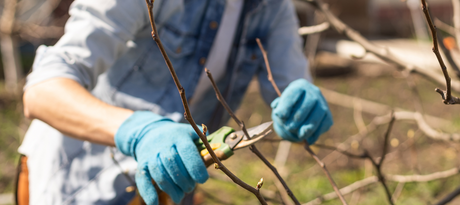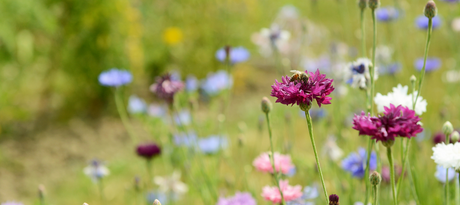Quick start ⚡ Quick start info for sowing pumpkins ⚡
🌱 Sowing & planting
- Sowing depth: 2.5 cm
- Pre-sowing: in 12 cm pots (1 seed per pot is ideal)
- Germination temperature: around 21 °C
- Germination period: approximately 7–12 days
- Planting distance: 100–700 cm around the plant, depending on the variety and growth strength
- Growth cycle: 200–255 days (long cultivation, early starting pays off)
- Plant out: when the plant has 4–8 true leaves and the frost has passed
- Save space: you can train pumpkins along mesh or a rack (not for the really large varieties)
📅 Growing times
- Pre-cultivation (under glass): sow mid-April–May, plant out outdoors mid-May, harvest September–October
- Directly in open ground: sow May–June, harvest mid-September–October
Pumpkins are heat- and space-hungry. A rich, warm spot with plenty of moisture and nutrients produces the most beautiful fruits.
📘 Basic information
- Latin name: Cucurbita
- Crop group: Fruit crop
- Crop family: cucumber family (Cucurbitaceae)
- Plant height: 30–65 cm, but tendrils can creep for several metres
- Frost resistant: no – absolutely sensitive to frost
- Root system: 60–90 cm deep
- Fertilization: plenty – richly fertilized soil with compost, universal vegetable garden pellets, cow manure pellets and possibly nettle or comfrey manure
- Preferred soil: pH 6.5–7.0, humus-rich and well-moistened
🌞💧 Pitch & water
Position: ☀☀☀ lots of sun – warm, sheltered spot.
Watering: 💧💧 moderate to generous – the soil should not dry out during the growing season, but avoid constantly soaking wet soil.
🤝 Good & Bad Neighbors
- Good neighbors: corn, marigold, melon, buckwheat, radish, nasturtium, dill
- Bad neighbors: potato
❗ Dangers & Concerns
- Powdery Mildew: Typical white-gray mold on leaves, especially later in the season. Provide air circulation and avoid water on the leaves.
- Snails: especially dangerous for young plants. Protect the plantings with snail barriers, beer traps, or other measures.
🧺 Harvesting & storing
- Harvest when the pumpkin stem becomes woody and the skin feels hard and firm.
- This is usually in the fall (September–October).
- Cut the pumpkin with a piece of stem left on; this will extend the storage life.
- Store pumpkins in a cool, dry, and frost-free place; many varieties can be kept for months.
🍽️ Nutritional value
Per 100 g cooked/baked pumpkin:
- 20 kcal
- 0 g fat
- 5 g carbohydrates
- 1 g protein
- 1 g fiber
- 2 g sugar
- Vitamins: A, B6, C and E
- Other: folic acid, thiamine, niacin, iron, magnesium, phosphorus, riboflavin, potassium, copper and manganese.
Table of Contents:
Sowing pumpkins for a warm autumn

Planting pumpkins is an adventurous and rewarding activity. From a single small seed, a lush plant can grow, stretching out its tendrils all summer long and rewarding you with beautiful fruits in a variety of colors. Sowing pumpkins not only offers a bountiful harvest but also contributes to a cozy and warm atmosphere in the home, especially during the fall. Pumpkins are often used in various dishes such as soup, pies, and jam, making them extra versatile.
Did you know that zucchini is related to pumpkins? Although zucchini and pumpkin look very similar and belong to the same plant family, there are clear differences in cultivation and use. Zucchini is often harvested young, while pumpkins usually ripen fully on the vine.
There are many different varieties of pumpkins, varying in size, color, shape, and flavor. Some varieties produce small fruits or pumpkins, which are ideal for small gardens, pots, or decorations. Pumpkins can come in a variety of colors, from white to green, orange, and blue-gray, which also makes them visually appealing.
In the following sections, you'll learn about the different ways to sow pumpkins, both indoors and directly in the ground. We'll discuss:
- Germinating pumpkin seeds
- Pre-sowing in pots
- Moving seedlings
- Hardening off young plants Finally, we will discuss sowing pumpkins in the open ground.
Germinating pumpkin seeds
Sprouting pumpkin seeds is a crucial first step in growing these large plants. You can start with seeds from different pumpkin varieties, depending on the desired shape and flavor. Key points for germinating pumpkin seeds include:
- Pumpkin seeds germinate best at a temperature of about 20°C.
- It is important that the seeds are placed in a place where the temperature remains constant.
- Without this warmth, the seeds won't germinate. Pumpkin seeds need at least 18°C (64°F) to germinate during the day, preferably 20°C (68°F).
- For a good yield and flavor, use purebred seeds. You can also save seeds from healthy pumpkins for next year.
Pumpkin seeds usually germinate within a week, provided the right conditions are provided. Keep the soil moist and water carefully to prevent the seeds from rotting.
By following these simple steps, you'll lay a solid foundation for healthy pumpkin plants.










